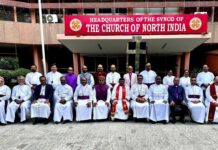Last week, in a brazen maneuver to cut matters short in the South Carolina litigation, the Episcopal Church (USA) and its ersatz diocese filed a request, invoking the original jurisdiction of the South Carolina Supreme Court, for that court to issue its writ of prohibition to prevent the lower court from conducting any further proceedings on remand in the matter.
Some non-legal commentators on the ECUSA side have used the word “appeal” to describe what the church did, but that term assumes there was an order from which to take an appeal — and there wasn’t, at least not yet. The lower court judge assigned to the case on remand, Judge Edgar Dickson, had scheduled a hearing in the case for this Thursday to consider the motion and petitions filed by ECUSA and its diocese to appoint a special master, order an accounting and issue writs of execution to force the parishes to hand over their properties.
Given that ECUSA and its diocese have constantly complained that Judge Dickson has steadfastly ignored their motions and petitions, it is curious indeed to puzzle out just why they chose last week to try to cut matters short in the trial court, after the judge had notified all the parties that he would take up ECUSA’s requests. Perhaps they were afraid that he might actually deny them on their merits — thereby creating an order that they would have to appeal.
By invoking the Supreme Court’s original jurisdiction over its inferior courts, the ECUSA parties at this point are demonstrating outright that they no longer have any confidence in Judge Dickson’s integrity to reach an impartial resolution of the puzzle presented to him by the five scattered opinions that came from the Court. Just as they requested the Court last June, ECUSA’s attorneys want to have the Court step in now and put an end to further delay in implementing what they claim was the Court’s “clear mandate.”
The problem is, the Supreme Court’s membership has changed since it rendered its fractured decision. Two of the then Justices (Toal and Pleicones) have retired from the Court, while a third (Hearn) belatedly recused herself from taking any further part in the case. That leaves only Chief Justice Donald Beatty and Justice John Kittredge out of the original panel, and those two were at odds with each other: the Chief Justice supported the official ECUSA line about the Dennis Canon, while Justice Kittredge was having nothing to do with any sort of remote trust that could be imposed on a parish’s property without its written consent.
Under those circumstances, the success of the petition filed by ECUSA will at the outset turn upon the view of it by the two new appointees to the Supreme Court: Justice John Cannon Few and Justice George C. James, Jr. If they agree between themselves on how to deal with the petition, their votes will carry the day by making the tally 3-1 (whether to deny the petition or to grant it). And if they disagree? The result (presuming that the C.J. and Kittredge are still at odds) would be a 2-2 tie, with the result that the writ could not issue.
Long and short of it: The Court will issue the petition restraining Judge Dickson only if the two new appointees both vote with the Chief Justice to grant the writ.
After all, there is nothing compelling the Court to be as impatient as ECUSA is to get a result; the Justices will each still collect their paychecks regardless of how they rule. And after all the time and effort Judge Dickson has expended to get to the point where he is now ready to take up ECUSA’s motions, one would think that the Court will be in no great hurry to take the case away from him, either.
Could it be that there is so little merit to the ECUSA side of the matter that they have grown desperate to avoid any actual ruling on just how weak their arguments are?
For instance: in their petition, ECUSA’s attorneys bluster and say (p. 4):
This Court already reviewed the evidence from the trial record, considered the issues preserved for appeal, reached a final decision, and remitted this case to the Circuit Court for enforcement purposes. Petitioners (the prevailing parties before this Court) cannot be forced to re-litigate these issues nor can the Circuit Court re-adjudicate them.
There is a good deal that these assertions simply gloss over, or take for granted. Because I have already commented extensively, in earlier posts, on the faults and discrepancies in the various individual opinions, I will not repeat that analysis here. Suffice it simply to point out one of the grossest exaggerations of all made by ECUSA and its attorneys, namely that Chief Justice Beatty’s opinion showed that he agreed with Justices Pleicones and Hearn that the trial court’s findings as to the ineffectiveness of the Dennis Canon to create any trust could be ignored. As I explained earlier:
From what the separate Justices state in their opinions, it has to be concluded that only two of them (Pleicones and Hearn) were in favor of disregarding the findings of the trial court, and of starting anew from scratch. The other three apparently believed that the trial court’s findings of fact were binding upon them, subject only to a substantial evidence requirement in support.
. . . In other words, there were three votes out of five (a majority) to regard the trial court’s findings of fact as binding upon the Supreme Court, rather than subject to de novo review. This analysis alone should give pause to those who triumphed in announcing that they had prevailed by a 3-2 vote.
In his separate opinion concurring partly in those of Justices Hearn and Pleicones, Chief Justice Beatty voted in favor of reversingthe trial court’s legal conclusion (following the rule handed down in the Waccamaw case — see the previous post) that the Dennis Canon could not create an effective trust in South Carolina. Instead, C.J. Beatty concluded that the Canon, in combination with the individual parishes’ supposed “accessions” through their corporate articles and bylaws, operated to create a binding and irrevocable trust on their properties in favor of the national Church and its diocese, as a matter of law.
This conclusion, as just noted, was one of law, not of fact. So the adjudicatory effect of Chief Justice Beatty’s opinion depends upon his application of the law to the trial court’s factual findings (which were binding upon the three members of the appellate court who rejected the “equity” standard of review). The problem that underlies Chief Justice Beatty’s legal conclusion is that it rests upon certain assumptions of fact that were contrary to those found by the trial court (e.g., that the various “accessions” signed by the individual parishes were informed enough to operate as a consent to the creation of a trust that was legally recognizable [“cognizable”] under South Carolina law).
A good part of the petition for rehearing (pp. 18-22, and 24-31) is devoted to a detailed showing that there was never any express consent by the various parishes, under the specific wording of their so-called “accessions” to the national Church’s canons (including its Dennis Canon after 1979), that would be sufficient under South Carolina trust law to create any kind of trust in favor of ECUSA and its local diocese in those parish properties.
Justice Beatty does not address these discrepancies — he was unaware of them, since the documents were not made part of the record on appeal (because ECUSA never raised any appellate issue involving them). Justice Beatty apparently relied for his conclusion on the unsupported assertions of ECUSA’s attorneys, made in a post-trial motion for reconsideration, that all the subject parishes had “acceded” to the Dennis Canon. He simply delivers an omnibus ruling that the standards for trust creation were met in the case of parishes who “acceded” to the national canons (i.e., according to the representations of ECUSA’s attorneys — which were not evidence in the case).
Thus there is good reason to fear, once Judge Dickson cuts through the thickets of argument and reads what the Justices’ individual opinions actually said and decided, that the trial court on remand will need to finish the job that the Supreme Court avoided: evaluate the actual evidence as to just which of the 29 parishes actually acceded to be bound by the terms of the Dennis Canon.
And that observation, I submit, goes a long way towards explaining just why ECUSA, its diocese and their attorneys all thought it time to prod the hibernating bear in its cave: better to face a sleepy bear than a judge who is actually taking the trouble to inform himself as to what happened. Stay tuned for more.










